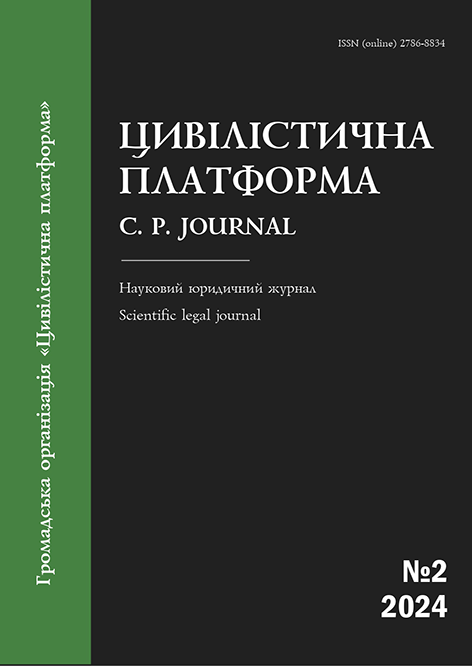Abstract
The article considers science parks as an effective form of participation of higher education institutions and research institutions in innovation relations. The author emphasises that higher education institutions and research institutions are the generators of all innovation processes in society, and therefore the creation of science parks with their participation is an effective platform for the development and implementation of innovations. Science parks are a legal instrument for obtaining funding for the activities of higher education and research institutions. As a result, science parks are legal entities in which society is most interested. Therefore, the author defines science parks as legal entities with special social value.
The article emphasises that while for a classical entrepreneurial legal entity the symbiosis of private and public interests characteristic of it is manifested in the dominance of the former, the legal nature of science parks determines the priority of public interests, which is manifested in the functions of a science park established by law.
Legislation is based on special legal regulation of science parks which are established and operate in one of the forms of economic partnerships. The article notes the evolution of legal regulation of science parks. The author emphasises that the first version of the special law emphasised public law mechanisms for regulating science parks. The law established an exclusively permissive procedure for the establishment of science parks, a higher education institution or a research institution could be the founder of only one science park, and the form of a science park was not defined. The current version of the special law is marked by changes in the direction of private law approaches to the regulation of science parks. The law clearly defines that science parks are created and operate in the form of business entities, and removes
restrictions on the number of science parks that can be created by a higher education institution or research institution. Science parks have become a more universal form of innovation development and implementation.
The author concludes that the conceptual approach to the circle of science park founders (higher education institution and/or research institution, other legal entities) and the mechanisms for involving other persons in the implementation of projects by a science park through the institution of partnership is correct. At the same time, the author emphasises the need for certain clarifications of the provisions set out in the special law, which are based on achieving the efficiency of the science park’s implementation of the functions and purpose of its creation.
How to Cite
In accordance with DSTU 8302:2015:
Зеліско А. Наукові парки як учасники інноваційних відносин в умовах появи нових соціально-економічних викликів. Цивілістична платформа. 2024. № 2. С. 184-192. https://doi.org/10.69724/2786-8834-2024-2-2-184-192
According to the international style of APA:
Zelisko, A. (2024) Science parks as participants of innovation relations in the context of new socio-economic challenges. С. P. Journal, 2. https://doi.org/10.69724/2786-8834-2024-2-2-184-192 [in Ukrainian].
References
Legislation
1. Pro naukovi parky: [About science parks] Zakon Ukrainy [Law of Ukraine] vid 25 chervnia 2009 roku №1563-VI <https://zakon.rada.gov.ua/laws/show/1563–17#Text> (accessed: 22.04.2024) [in Ukrainian].
Bibliography
Articles
2. Davydova N. Avtonomizatsiia tsyvilno-pravovoho statusu vyshchoho navchalnoho zakladu (2014) 33 (4) Yurydychnyi visnyk 88–93 [in Ukrainian].
3. Krupchan O. Stratehiia pryvatnopravovykh naukovykh doslidzhen na suchasnomu etapi rozvytku Ukrainy (2015) 14 Pryvatne pravo i pidpryiemnytstvo. http://ndippp.gov.ua/content/%D0%B2%D0%B8%D0%BF%D1%83%D1%81%D0%BA-14–2015-D1%80%D1%96%D0%BA [in Ukrainian].
4. Savchenko S. Spivvidnoshennia pryvatnykh i publichnykh interesiv: dosvid Ukrainy Porivnialno-analitychne pravo (2013) 3 [in Ukrainian].
5. Pidopryhora O. Rozmezhuvannia i vzaiemodiia publichnoho i pryvatnoho prava yak metodolohichna problema vitchyznianoho pravoznavstva Visnyk Akademii pravovykh nauk Ukrainy (2002) 4 [in Ukrainian].
6. Shcherbyna V. Publichni y pryvatni interesy v hospodarskykh vidnosyna Teoretyko-metodolohichni pidkhody do rozuminnia pryvatnoho prava v suchasnykh umovakh (2014) 13 Naukovo-doslidnyi instytut pryvatnoho prava i pidpryiemnytstva im. akademika F. H. Burchaka NAPrN Ukrainy http://ppp-journal.kiev.ua/archive/2014/13/9.pdf [in Ukrainian].
7. Zharovska I. Publichni ta pryvatni interesy u mekhanizmi suchasnoi derzhavnoi vlady Naukovyi visnyk Chernivetskoho universytetu (2010) 525 Pravoznavstvo <http://lawreview.chnu.edu.ua/visnuk.php?lang=ua> [in Ukrainian].
8. Pervomaiskyi O. Pryvatnyi ta publichnyi interes u tsyvilnomu oboroti : okremi pytannia Stabilnist tsyvilnoho oborotu v Ukraini : problemy zabezpechennia: zbirnyk naukovykh prats. Vypusk druhyi / Belianevych O., Berestova I., Hryniak A.,
ta in. / za red. Belianevych O. K. NDI pryvatnoho prava i pidpryiemnytstva im. akademika F. H. Burchaka NAPrN Ukrainy, 2014 [in Ukrainian].
